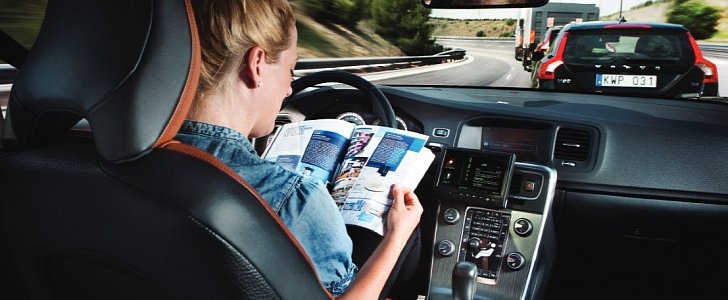And here we were, fearing that the advent of self-driving cars would put people off driving, thus making the idea of owning a car a lot less attractive, when in fact it might turn out to be quite the opposite.
Not having to drive our cars will have a serious impact on how we view the whole idea of personal transportation. As feverishly as you might be opposing the idea now, you can’t deny the fact that a lot of time is being wasted behind the wheel, time that could be put to better use. For instance, to read a book, browse the news, have a chat with somebody where you can actually take part in the conversation 100 percent without having to worry about traffic, and so on.
The car will become a totally different environment from what we’re used to now, especially if Google has its way and makes the steering wheel redundant. However, some of the benefits promised by the driverless cars - fewer accidents, more fluid traffic, better efficiency - might be negated by one very important fact: unless the cars are shared more than it’s happening now, their number can only grow.
A study published on Thursday by the University of Leeds, University of Washington, and Oak Ridge National Laboratory analyzes the impact the self-driving cars will have on energy demands in 2050. When speaking about autonomous vehicles, most people focus on the advantageous parts - less congestion, platooning (driving at very short distances to reduce drag, which now isn’t dangerous anymore since the cars communicate with each other), or lighter construction due to the reduced risk of accidents - but they might be missing on a few key aspects.
For instance, since commuting is suddenly a lot less stressful and unpleasant, while the lighter traffic also reduces the time taken to get to work, people might be encouraged to travel farther away from where they live than before. At the same time, a host of people who previously didn’t own or drive a car for various reasons - afraid to drive, unable to drive (disabled) or too old to drive - could now venture into the newly created safe traffic. So the traffic may move more fluidly, but it won’t necessarily be lighter.
We feel we’re safe from these predictions, though. We think that car sharing will definitely grow once the driverless vehicles start to become the norm (notice nobody says “if” anymore), and traveling will become a social act. Going out for a drink will start in the car, and so will having a gossip with your workmates.
The car will become a totally different environment from what we’re used to now, especially if Google has its way and makes the steering wheel redundant. However, some of the benefits promised by the driverless cars - fewer accidents, more fluid traffic, better efficiency - might be negated by one very important fact: unless the cars are shared more than it’s happening now, their number can only grow.
A study published on Thursday by the University of Leeds, University of Washington, and Oak Ridge National Laboratory analyzes the impact the self-driving cars will have on energy demands in 2050. When speaking about autonomous vehicles, most people focus on the advantageous parts - less congestion, platooning (driving at very short distances to reduce drag, which now isn’t dangerous anymore since the cars communicate with each other), or lighter construction due to the reduced risk of accidents - but they might be missing on a few key aspects.
For instance, since commuting is suddenly a lot less stressful and unpleasant, while the lighter traffic also reduces the time taken to get to work, people might be encouraged to travel farther away from where they live than before. At the same time, a host of people who previously didn’t own or drive a car for various reasons - afraid to drive, unable to drive (disabled) or too old to drive - could now venture into the newly created safe traffic. So the traffic may move more fluidly, but it won’t necessarily be lighter.
We feel we’re safe from these predictions, though. We think that car sharing will definitely grow once the driverless vehicles start to become the norm (notice nobody says “if” anymore), and traveling will become a social act. Going out for a drink will start in the car, and so will having a gossip with your workmates.

